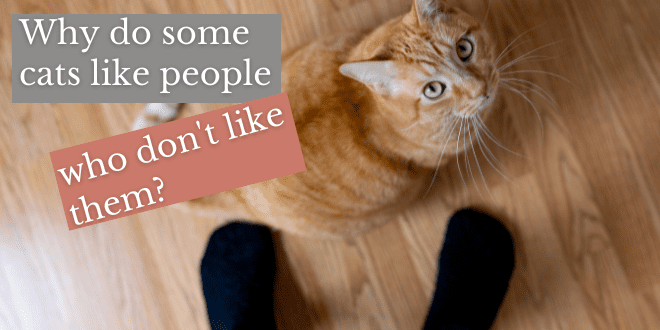For those who consider cats family members, it is almost inconceivable that some people dislike cats or actually may even hate them. But even though we may not understand why some people may dislike the traits that most cats share, there are still some logical reasons for cat avoidance.

Cat Allergies
It is understandable why people with allergies to cats refuse to be anywhere near them. They may not “hate” cats per se, but they may justifiably hate the way cat dander triggers their mild to severe allergy symptoms.
Cat hair and other pet hair are actually not the culprit; the triggers people react to are the coat-protective proteins secreted by the cat’s skin. People with cat allergies may also be reacting to protein molecules that are secreted into the cat’s saliva or urine.
Territory Ranges Beyond the Household
Given the chance, most cats will opt to defecate outside in rich and deep garden soil, even if that soil is in a neighbor’s yard. Outside cats will leave their droppings uncovered as a territorial marking to relay information to other cats in the area. Nearby households will not be spared, as cats do not understand property lines or other yard boundaries.
Cats will also prolifically spray urine against outside walls and doors of other dwellings in the neighborhood to mark their outside territories, especially if cats are known to be dwelling inside. This causes two separate problems when the indoor cats either observe the cat outside through a window or smell the acrid odor of the urine spray.
Killing Birds
Cats, being obligate carnivores, are predators. Whether the cat is indoor-only, free-roaming but owned, or feral and stray, birds and mice are a cat’s favorite prey.
National groups such as the Alley Cats Allies and Alley Cat Rescue have established protocols to support feral cat colonies in managed care. The cats are trapped, neutered or spayed, and then released back into their colonies.
A vital part of all managed care for feral cats is feeding the cats, which precludes their need to kill wild birds for food. Alley Cat Rescue goes a step further in setting aside the kittens and partially tame young adults in their adoption center.
But cat owners can also do their part. Songbirds and brightly colored wild birds bring both audible and visual joy to cat owners’ lives, and many will go to any lengths to protect them from their cats. Think about adding birdhouses and bird nesting material to your exterior surroundings, while at the same time providing more activities for the cats to engage in other than the wildlife. Cats do enjoy watching bird feeders through the window.
Biting and Scratching
Cats are able and willing to communicate both their likes and dislikes. They often communicate quite vocally, and sometimes even physically, with a swift swat of outstretched claws when too much petting overstimulates them.
Aggressive scratching and biting behaviors are learned very early in a cat’s life, during kittenhood. Cats that are taught that human hands are playtoys will often bite their owners’ hands when they become adults.
It may be that people who dislike cats had a bad experience with a young cat when they were young children themselves; an adult should always be present to teach both child and kitten about the safe limits of play. Many young families even give up their first cat because of this misunderstood juvenile scratching or biting behavior.
When you teach your cats that scratching and biting behaviors are not allowed, it may just serve as an example to your wary visitors that cats can be re-taught how to not scratch and bite at any age.
Tricky Relationships With Humans
Some people dislike cats because they are fickle and aloof when it comes to relationships with their human housemates. If someone makes a cat uncomfortable or frightened, a cat will be sure to make it known with a hiss or a swat.
In comparison to subordinate and fun-loving dogs, cats may seem unappreciative. In nature, though, cats and dogs evolved very different lifestyles. Dogs evolved to live in family packs, as teamwork was needed to hunt large prey. Wild cats eat smaller prey and evolved to be lone hunters and fishers. And yet it is that very same independent nature of cats that makes them very adaptable to our changing environments and changing daily routines.
As long as cats are socialized to humans as kittens, cats can form close bonds with their humans. But when a self-directed independent cat acts in a standoffish manner, it is most often due to a new person coming into the household.
Even the shy cat is observant and assesses the relative safety of newcomers. Given time to learn, a cat will usually come around to accept them as a friend and trusted caregiver.





